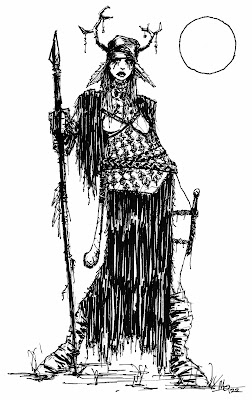Robert E. Howard, Clark Ashton Smith, H.P. Lovecraft, these are the three main authors (among a few others) that Jeffrey P. Talanian's, HYPERBOREA, (formerly, Astonishing Swordsmen & Sorcerers Of...) seeks to emulate using a chassis that lies somewhere between B/X and AD&D.
This is technically the third edition of this game which was first published as a box set in 2013, then as a massive hardback tome in 2017. I own neither of those two editions, though, I was aware of them. By the time this game really captured my attention, the first two editions were out of print and rare. I had managed to view a PDF of the 2nd edition (back when such a thing was easier) and what stuck in my head were these cool pencil sketches... more on that below. A perfectly-bound, paperback Player's Manual, also came into existence not too long ago, which I was all set to buy, when I discovered that a 3rd edition was imminent. That 3rd edition kickstarted about a year ago, the result of which are the handsome books you see above.
Physically each book is a little over 300 pages (Player's Manual and Referee's Manual.) Both covers have this cool matte feel to them and the interior pages are cream colored, non-glossy and very easy to read. The layout is clean, well organized and full of art (some great, some not-so great.) Basically, these are nice books. (Personally, I would've preferred a single giant tome, like the 2nd Edition.)
Also pictured above is the soft-cover atlas of the HYPERBOREAN world -- which exists far into the future, is shaped like a planetary-sized hex, and orbits somewhere out near Saturn around a now dying, red sun. This is sword & sorcery for the most part, but there are elements of sword & science such as you see on the above Player's Manual cover and in the picture below. Obviously it's up to you if you want your knightly warrior to wield a ray-gun (aside from my own anomalous adventure, DATE OF EXPIRATION, it's usually not my thing) Setting aside, it's the system that I care most about...
And this system is fairly standard D&D -- classes, hit points, armor class, saving throws, Vancian-ish Magic, etc. The rules are not quite as basic as B/X, yet not as detailed as AD&D.
Where HYPERBOREA is neither basic or advanced, is how it handles races. Here, with the exceptions of Atlantean and Hyperborean (who are technically not humans) you only play as humans. The races are as follows:
- Common
- Amazon
- Atlantean
- Esquimaux
- Hyperborean
- Ixian
- Kelt
- Kimmerian
- Kimmer-Kelt
- Pict
- Pict (Half-Blood)
- Viking
- Anglo-Saxon
- Carolingian Frank
- Esquimaux-Ixian
- Greek
- Lapp
- Lemurian
- Moor
- Mu
- Oon
- Roman
- Tlingit
- Yakut
- Fighter
- Barbarian
- Berserker
- Cataphract (Need eye surgery? Knight would be better)
- Huntsman (Hunter is better)
- Paladin (Champion perhaps? Seems like sword & sorcery has Champions)
- Ranger
- Warlock
- Magician
- Cryomancer
- Illusionist
- Necromancer
- Pryomancer
- Witch
- Cleric
- Druid
- Monk
- Priest
- Runegraver
- Shaman
- Thief
- Assassin
- Bard
- Legerdemainist (thief/magician) --who wants to say this? (how about Trickster?)
- Purloiner (thief/cleric, Cultist or Zealot is better)
- Scout
- Death
- Transformation
- Device
- Avoidance
- Sorcery
- Thieves are better at finding secret doors than everybody else... why haven't I seen that before? Thief skills use the d12 and they start out fairly competent. Actually, the d12 gets a lot of love in HYPERBOREA.
- Witches' are very "witchy," they brew things, make effigies, have useful familiars and actually ride brooms! -- eventually.
- Priests get more spells than any other class.
- Clerics use spells like magicians do, meaning, all spells of a level aren't available to them.
- Fighters are fairly lame, as usual, sure they get multiple attacks vs 1 HD foes, so they'll kick-ass if you're only fighting orcs (btw, HYPERBOREAN orcs are unabashedly EVIL, this game gets my vote for that alone.) Cleave/damage bonus/carry-over damage would be better, again, easy to house-rule these types of things.)
- Huntsman, Ranger, and Scout are kind of similar.
- The Runegraver seems more like a concept class that would appear in someone's zine.
- The Shaman is exactly what a Shaman should be. Very well done here.
- Assassins have to jump through one-too-many hoops to assassinate someone. I love assassins, don't gimp them.
- The Warlock is basically the Elf (designed better) if you wanted to play one.
- Assassins, Huntsmen, and Shamans can harvest venom from slain monsters. Anyone else can try, but these classes are much better at it. Very cool, but it's a static ability that oddly doesn't increase with levels.
- Simple Alchemy rules exist to brew potions, decoctions, and poison, for most spell-casters. Also very cool.
- Tactical combat options exist, though I feel they would mostly be ignored (or abused.) Examples are shield-bash, pommel strike, two-weapon fighting. Some are cool though.
.jpg)








